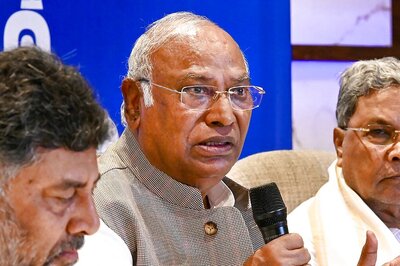
views
Tripoli: Libyan rebels on Sunday rejected an offer by Muammar Gaddafi to negotiate and said they have captured the eastern town of Bin Jawwad, forcing regime loyalists to flee after days of fighting.
With his regime crumbling, Gaddafi is on the run, but his chief spokesman Moussa Ibrahim told the Libyan leader is still in Libya. As the call for negotiations came, new signs emerged of arbitrary killings of detainees and civilians by Gaddafi forces during the rebels' push into Tripoli earlier this week, including some 50 charred corpses at a regime lockup.
The rebels dismissed Gaddafi's proposal, relayed by Ibrahim by phone, to have his son al-Saadi lead talks on a transitional government as delusional.
"I would like to state very clearly, we don't recognize them. We are looking at them as criminals. We are going to arrest them very soon," Mahmoud Shammam, the information minister in the rebels' transitional government, told a news conference. "Talking about negotiations is a daydream for what remains of the dictatorship."
In London Sunday, British Foreign Secretary William Hague also dismissed the offer, saying the National Transitional Council was already in charge of the country and that Gaddafi should call on his supporters to stop fighting.
"I referred a few days ago to Col Gaddafi making delusional statements and this is another one of them," Hague told the BBC.
The rebels control most of Libya, including Tripoli, but are struggling to alleviate shortages of water, fuel and electricity in the capital. Usama el-Abed, the deputy leader of the new city council, said between 60 and 70 percent of the residents don't have enough water, but that the shortages are due to technical problems, not sabotage by regime forces.
The UN is preparing to ship in baby food, bottled water and medicine. World Health Organization officials are on Malta, some 350 kilometers (225 miles) north of Tripoli, to prepare the aid shipments, which are expected to leave for Libya in the next few days.
In one small attempt at returning to normal, a traffic policeman in a white uniform was on duty Sunday in an eastern neighborhood of Tripoli. "Today is the first day that we started working. Things are under control and running smoothly," said traffic cop Abu Bakr al-Murbet.
Some 1,000 Egyptians, Jordanians and Filipinos boarded a passenger ferry in Tripoli's port Sunday to escape instability and shortages. Most people said they plan to return to their jobs in Libya once the situation calmed down.
Before the outbreak of fighting, large numbers of foreign workers - some estimates go as high as 2.5 million - were employed in oil-rich Libya, though hundreds of thousands already fled.
In Sunday's fighting, rebels threatened to advance on the coastal road toward Gaddafi's hometown of Sirte if tribal leaders there don't agree to surrender.
Mohammed al-Rajali, a spokesman, said rebel forces captured Bin Jawwad, about 350 miles (560 kilometers) east of Tripoli, late Saturday and deployed forces in the city after days of fighting. He said Gaddafi's forces fled westward, likely to join regime forces in Sirte, the headquarters of Gaddafi's tribe and his last major bastion of support.
Sirte has been heavily targeted by NATO airsrikes.
On Sunday, an AP reporter found some 50 charred corpses in a makeshift lockup near a military base that had been run by the Khamis Brigade, an elite unit commanded by Gaddafi's son, Khamis.
Mabrouk Abdullah, who said he survived a massacre at the site by Gaddafi's forces, told The Associated Press that on Tuesday guards opened fired at some 130 civilian detainees in the lockup, a hangar, and fired again when prisoners tried to flee.
Abdullah said he had been crouching along a wall and was shot in his side, lifting his shirt to show his injury.
New York-based Human Rights Watch said Sunday it has gathered evidence indicating that Gaddafi loyalists killed at least 17 detainees and arbitrarily executed dozens of civilians as rebels moved into Tripoli.
AP reporters have also witnessed abuse of wounded Gaddafi fighters by rebels and their supporters. Earlier this week, eight injured men were abandoned in a bombed out fire house in the Abu Salim neighborhood, some pleading for water, but residents and rebels made no effort to help them.
However, in many other instances, Gaddafi fighters were treated side by side with rebels in rebel-controlled hospitals.




















Comments
0 comment